Thanks to the world getting to some place approaching normal in 2021, I went back to the activities I loved that didn’t cause me to stay cooped up. Alas, that meant I didn’t devote as much time as I should have to this project. Thus, it’s late by a month. But that did give me the opportunity to revisit some films I hadn’t seen in 20 years, many of which revealed deeper worlds within, which my adolescent brain couldn’t quite appreciate at the time.
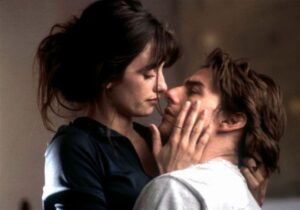
20. Vanilla Sky (dir. Cameron Crowe)
Cameron Crowe is one of our country’s most sincere filmmakers. On paper, his style should clash with this unforgiving sci-fi remake. But he guides his Jerry Maguire star through hell and back with impeccable needle drops and disturbing images. As the biggest hit of his career, I wish he would have continued down this path instead of making increasingly syrupy family dramas.
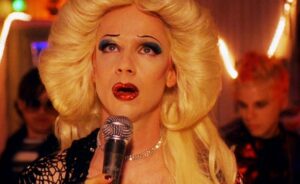
19. Hedwig and the Angry Inch (dir. John Cameron Mitchell)
Unapologetically brash and emotional, this rock musical goes deep on gender identity, betrayal and resiliency. Mitchell adapts his own musical, giving the film vibrancy and lived-in authenticity. There are still too few films like it.
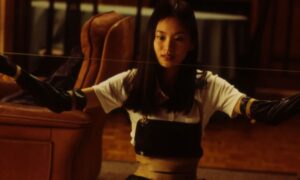
18. Audition (dir. Takashi Miike)
One of the most terrifying films ever made, Miike’s breakout film in the U.S. holds off on its scares for a good hour of the film. And then… a phone call. After that, all bets are off, and it’s a delirious, hellish nightmare.
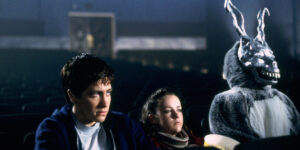
17. Donnie Darko (dir. Richard Kelly)
Whether you prefer the original or the less ambiguous Director’s Cut, it’s hard to deny the power of Richard Kelly’s debut feature. Bleak, disturbing and wholly original, it’s an important film for any Millennial. While the film has been memed and Kelly has yet to make anything nearly this good again, it endures for its dark beauty.
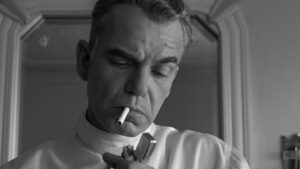
16. The Man Who Wasn’t There (dirs. Joel & Ethan Coen)
Foolishly considered a lesser entry in the Coen Brothers’ sterling filmography, their black-and-white noir is one of their best. Billy Bob Thornton – who had an incredible year with this, Bandits and the Oscar-winning Monster’s Ball – stars as a Ed, bored barber who blackmails and kills his wife’s lover (James Gandolfini) and gets away with it. But fate makes sure he’s punished, first with his wife (Frances McDormand) arrested for the murder, then with Ed implicated in the death of his shady business partner (Jon Polito). With typically lush cinematography from Roger Deakins and pitch black humor, this is one worth rediscovering.
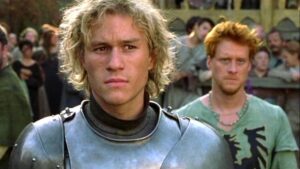
15. A Knight’s Tale (dir. Brian Helgeland)
Aside from one film later on this list, this is the most rewatchable film of 2001. Though hardly a success at the time of its release, it was not found wanting in the years after its home video release. The sheer star wattage of Heath Ledger could have powered the entire state of California during their energy crisis, but it’s Paul Bettany who steals the show with his energetic take on Geoffrey Chaucer.
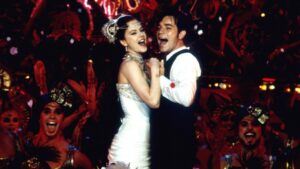
14. Moulin Rouge! (dir. Baz Luhrmann)
The last time the Australian director’s maximalist style worked. (Though we’ll see if his Elvis biopic can recapture the charm. I have my doubts.) It’s dazzling, heartbreaking and over-the-top by design. You’re either on board with Jim Broadbent doing backflips to Fatboy Slim and Nirvana in a period musical, or you’re no fun.
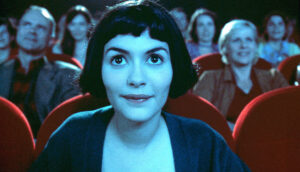
13. Amélie (dir. Jean-Pierre Jeunet)
Until 2001, Jeunet was known for his tactile and often disgusting sci-fi films (including a much-maligned Alien sequel). Who knew he was hiding such a big heart under there? Audrey Tautou, who somehow didn’t get nominated for Best Actress, is luminous as our heroine, who travels Paris searching for ways to make people happy. She succeeds in putting a big smile on the face of the audience, too.
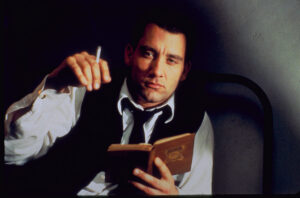
12. Gosford Park (dir. Robert Altman)
I didn’t appreciate Altman’s sprawling dramedy at the time. It was too dry for my taste, despite having some great moments. Now it feels like the perfect marriage of director and writer (Julian Fellowes). I never got into Downton Abbey, despite it being on in my house constantly. The class satire that faded in that show and its two movies is still brilliant here.
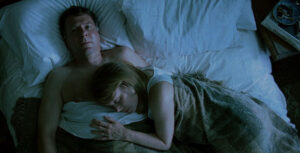
11. In the Bedroom (dir. Todd Field)
This tiny independent drama shocked a lot of folks when it wound up with five Oscar nominations, including Best Picture. But anyone who’s seen it knows they were all richly deserved. A quiet but exquisitely directed film, it deals with a lot of raw emotions without tipping over into melodrama. The ripple effects of a tragedy reveal deep sadness and pent-up frustrations in a seemingly perfect family. Field’s script and the cast’s performances are so perfectly calibrated that every character choice is understandable, if not exactly justifiable.
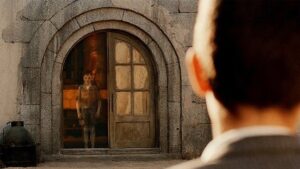
10. The Devil’s Backbone (dir. Guillermo del Toro)
One of the best ghost stories of all time, this sometimes feels like a dry run for Del Toro’s masterpiece Pan’s Labyrinth. The film smartly confines the action to the orphanage, which makes all the attacks it faces from the outside and in more terrifying. Like a lot of Del Toro’s work, the forces of good and evil are clearly defined, until they’re not. Alternately sweet and gruesome, it’s a perfect gateway to more extreme horror for preteens.
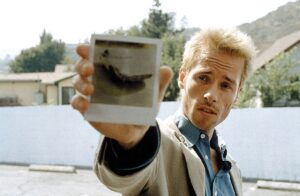
9. Memento (dir. Christopher Nolan)
“Don’t believe his lies.” With four words, the audience’s entire understanding gets flipped. Leonard Shelby (Guy Pearce) gives new meaning to the term unreliable narrator. As an amnesiac investigating the death of his wife, he’s a classic noir protagonist in a very modern story. Because we rarely know more than him and understand his desire for justice, we’re willing to accept the world as he sees it, until we’re too attached to accept the truth.
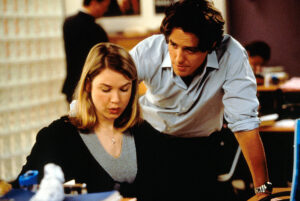
8. Bridget Jones’s Diary (dir. Sharon Maguire)
While the fat jokes haven’t aged well, the film overcomes them thanks to its otherwise razor-sharp wit and the perfect performances from Renée Zellweger, Colin Firth and Hugh Grant. This modern spin on Pride & Prejudice gets funnier every time, especially since lightning didn’t exactly strike again with its mediocre sequels. The romantic comedy’s decline over the past 20 years has caused the film’s reputation to deservedly rise as a classic of the genre.

7. A.I. Artificial Intelligence (dir. Steven Spielberg)
A lot of critics – myself included – got Spielberg’s dystopian Pinocchio wrong two decades ago. Most assumed the on-its-face happy ending was the sentimental maestro ruining Stanley Kubrick’s bleak adaptation. But while there’s plenty of raw emotion on display, there’s almost nothing happy about it, least of all its ending.
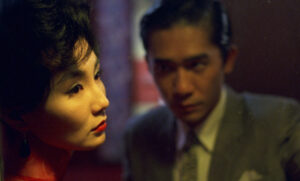
6. In the Mood for Love (dir. Wong Kar-wai)
One of the best movies ever made about loneliness and longing, Wong Kar-wai’s exquisite almost romance is achingly sad and astonishingly beautiful. It’s doubtful any two humans have ever looked hotter than Maggie Cheung and Tony Leung, or that smoking has ever looked more appealing. With little dialogue, you understand their desires and hesitation. Few filmmakers could convey so much within a single glance.
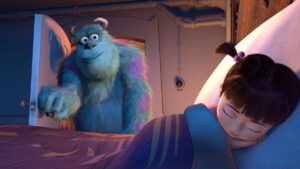
5. Monsters, Inc. (dir. Pete Doctor)
Top-tier Pixar: ruthlessly funny, genuinely emotional and viciously satirical.
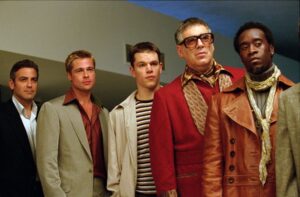
4. Ocean’s Eleven (dir. Steven Soderbergh)
What else is there to say about one of the most rewatchable movies ever made? This effortlessly cool heist comedy took Steven Soderbergh’s career to another level, and it’s impossible to watch it without a big smile on your face. When the guys stand around the Bellagio fountain while “Clair de Lune” plays? That’s cinema, baby!
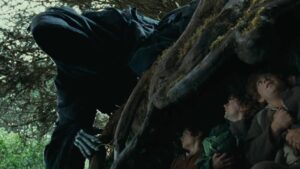
3. The Lord of the Rings: The Fellowship of the Ring (dir. Peter Jackson)
It seems hard to reconcile this, given the trilogy’s continued dominance in the culture, but this was a huge risk at the time. Peter Jackson was a New Zealand director known mostly for low-budget horror comedies, and New Line basically gave him $280 million to fuck off and shoot all three films concurrently in his native country. It could have bankrupted the studio and ended his career. But the impeccable attention to detail, fantastic performances and innovative VFX resulted in one of the most beloved film series of all time. Having rewatched the entire trilogy recently, I’ve now joined the consensus that the first entry is the best. It’s not endless set-up in the way the final chapter is endless conclusion. It’s buoyant, exciting and often terrifying (at least when the Ringwraiths are involved).
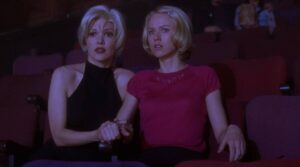
2. Mulholland Dr. (dir. David Lynch)
Another near-disaster, made into a classic by a master filmmaker. ABC rejected Lynch’s pilot but he cobbled together financing to turn it into a feature. You can occasionally see the seams where the dark-but-suitable-for-TV scenes jut up against the increasingly violent and sexual scenes that could only be in a feature film. Does it all add up to a coherent story? Not really! It would be inaccurate to call this an erotic thriller, but it contains some of the sexiest and most suspenseful scenes of any film of the 21st Century. It took me many tries to attempt to understand this one. I can’t say I fully do, but I do know it’s Lynch’s finest film.
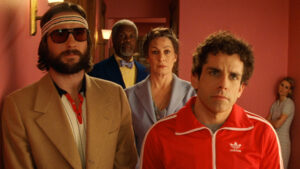
1. The Royal Tenenbaums (dir. Wes Anderson)
Anderson’s quirky idiosyncrasies are perfected here. While I remain a fan of all his films, this one has the most powerful blend of humor and heart. Gene Hackman, in one of his final performances, is absolutely dynamite here. Royal Tenenbaum may not have any scruples, but he has killer comic timing. The rest of the cast is similarly at the top of their games, forging a dysfunctional family that still can perform at least two functions: making us laugh and wince equally well.
Honorable Mentions
Ali (dir. Michael Mann)
Bandits (dir. Barry Levinson)
A Beautiful Mind (dir. Ron Howard)
Black Hawk Down (dir. Ridley Scott)
Ghost World (dir. Terry Zwigoff)
Heist (dir. David Mamet)
Josie and the Pussycats (dirs. Harry Elfton, Deborah Kaplan)
Legally Blonde (dir. Robert Luketic)
Session 9 (dir. Brad Anderson)
Sexy Beast (dir. Jonathan Glazer)
Shrek (dirs. Andrew Adamson, Vicky Jenson)
Tape (dir. Richard Linklater)
Waking Life (dir. Richard Linklater)
Wet Hot American Summer (dir. David Wain)
Zoolander (dir. Ben Stiller)